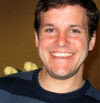Future events are more predictable than the past. Taleb stated this in Black Swan and provided good support. Essentially, this point in time could be created by infinite possible historical events. Some historical possibilities are quixotic: the world was created yesterday, and everything is the way it is. Others more rational: over 4.6 billion years the earth created life from a melting pot (which is the debate between creationists and everyone else). Even the recent past, i.e. yesterday, creates infinite nodes on a decision tree, and multiple nodes lead to the current point. Anyone could have done infinite events yesterday, not restricted by resources, time, other people, or environment, and be where they are now.
However, resources, time, other people, and environment bind the future. A person can only get so far today based on resources (i.e. money), time (only 24 hours better get going), other people (“liquidity for one, insolvency for all”), and environment (200 years ago you had a small possibility spectrum). Side note: I’m an optimist, and I believe in stringing together victories for change—not fell swoop, lottery changes to the future.
Past future decisions had more possibilities than current future decisions. Creation of predictive models attempts to tame the future based on collective handling of the future in the past. Past future decisions were based on resources, time, other people, and environment at that point in history.
Failures of models attempt to define collective output of all decisions with a limited number of inputs. Deviation from the future and predictive models occurs due to a change in inputs. Models disregard the current binding input in favor of past correlative inputs.
Bubbles happen when most inputs are found from past data, and perpetual future assumptions are made on this limited set of inputs. Crises happen when a new binding input is collectively found.
In 2007, what was the binding input: confidence, incoming or outgoing money? Economists are largely okay with cramming 2007 into current models, calling it largely accurate, and going forward. Economist’s antithesis wants them hung for not predicting the future.
Economists have shown they are excellent builders of models that match the events. However, they are lousy at determining the actual inputs.
Everyone poorly defines current restrictions on the future. For example, ask someone “What do you want to do?” Then ask them “Why aren’t you doing it?” That person will give a list of artificial restrictions.
Subscribe to:
Post Comments (Atom)

No comments:
Post a Comment